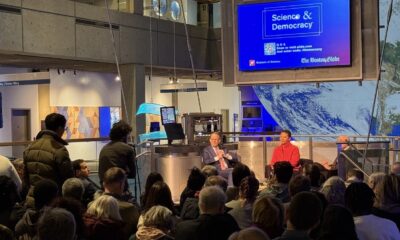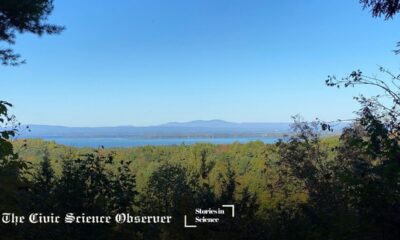Stories in Science Special Series
Breaking Through My Glass Ceiling…Twice
I was not born a scientist nor was I born with the knowledge that I would one day be a L’Oréal-UNESCO For Women in Science Laureate in France. However, I attained these achievements through maintaining curiosity, making difficult choices, sustaining perseverance, and overcoming obstacles through my ability to finding solutions and seeking opportunities.

– Brooke Tata, Ph.D. –
[dropcap]I[/dropcap] was not born a scientist nor was I born with the knowledge that I would one day be a L’Oréal-UNESCO For Women in Science Laureate in France. However, I attained these achievements through maintaining curiosity, making difficult choices, sustaining perseverance, and overcoming obstacles through my ability to finding solutions and seeking opportunities. These core attributes drove me to improve and develop the lives of others which is something I see as an ongoing journey. This journey to become who I am today has not been easy. Yet, it is an example of how one can turn adversity into opportunity through hard work and perseverance.

Brooke Tata
To specify, I had a scholarship being prepared to play tennis and the choice between College of Charleston or University of Virginia. Sports was my only way into education. However, my whole life changed when a drunk driver hit my car and broke my back. Ultimately, I ended up losing my tennis scholarship. I was devastated. But something important happened. I realized I had never questioned who I was or what I wanted to do. I was on a career and life that made my family happy, but not what made me happy. In fact, this is a struggle for many young people around the world.
Conforming to social and cultural norms is almost an unconscious habit to blend in and follow the paths paved that society and cultural gender-roles and stereotypes have defined for us. There are two major points in my life where I have struggled with this. The first was at this point – at the age of 18 – when it struck me that I had always followed the expectations of my family. The second was as a Laureate where I saw so many young women and girls still left behind. This ignited in me a desire to be a leader and advocate for women in Science, technology, engineering and mathematics education (STEM).
I not only had to tackle a new transition of life and culture, but I had to also learn a new language and a completely different way of working in research.
I grew up in the south of the United States – in Georgia to be exact – where still today, some stereotypes of girls and women are reinforced to be beautiful and marry a rich man instead of becoming well-educated or a professional. In fact, there were few societal expectations of women to be well educated; rather beauty and status were the norms. However, I was not ready to accept those cultural norms and expectations imposed upon me by some family members.
This drive ignited in me four key character traits: to be curious, real, confident, and a good listener. I developed these traits from overcoming many difficulties, rooted deeply in gender biased education, culture, society, and family expectations. I realized I must start from scratch to understand who I am, and what I wanted to do. Starting from zero can be scary, but life was giving me a second chance to find my purpose in life. I was up for the challenge.
As an undergraduate student at the University of Colorado, I was not just involved in scientific research and biology courses. I also made the time to get involved in multiple non-profit organizations including the Invisible Children, Global Samaritans, and Doctors without Borders in Zambia and Zimbabwe teaching young children about health awareness. I found my passion in creating programs as well as developing and educating others. Thus, putting together my passion for teaching young children and my interest in the human body and reproduction, I knew I wanted to do further research in graduate school and attain a PhD.
I had broken the perturbing cycle of being told I could not be a scientist because it was a boy’s club due to the fact that I did not conform to the gender-biased norms. I acquired qualities I cherish today that developed the courage inside of me to become a woman in science. I knew I would make a difference through research. However, I did not want to restrict myself to geographical borders, because understanding different cultures is key to advancing science.
I continued my higher education on an international scale beginning in Paris, France. Why? Well, France is a major hub for research in reproductive health and neuroscience, which favors collaboration in science with other countries. From this, I knew I could expand my cultural and scientific horizons. More importantly, I came to France because I value the fact that I uprooted myself a second time to study in an international setting which allowed me to not lose sight of the importance of human interactions, education, and cultures. This helped further develop the woman in science I am today.
Moving an entire ocean away from “home” was another risk. This time, I was not afraid. I was actually thrilled. I prepared my applications knowing that taking risks is better than holding back. From this, I completed both my Masters of Science in Genetics and PhD in Neuroscience from Paris Sorbonne Cité in collaboration with the Institut National de la Santé et de la Recherche Médicale (INSERM). Within five years abroad, I not only had to tackle a new transition of life and culture, but I had to also learn a new language and a completely different way of working in research. Indeed, I knew then, I had developed into a woman always up for a challenge.
My fears of going into the unknown had vanished all because I owned my persona as a female in science who did not mind standing out no matter where I was. I had come into my own. Now, I am a post-doctoral scientist in an INSERM laboratory based in Lille, France. Here, I continue to study how the brain controls fertility, and the mechanisms behind fertility disorders such as Polycystic Ovary Syndrome (PCOS). PCOS affects 1 in 10 women, and is the most common form of female infertility, yet the public is often unaware of this. As a woman with PCOS, I wanted to know more. I wanted to cure this syndrome and not just help treat the symptoms.
This is a perturbing cycle that I myself have lived and I want to make it stop.
In 2016, I was selected to be a Fellow for the L’Oréal-UNESCO Women in Science program in France for my research on PCOS as a Post-Doctoral Scientist. From there, I got involved in activities both in the L’Oréal Foundation and UNESCO sides as a voluntary Ambassador for Girls in Science and Women in Science program. Being a part of UNESCO events and an Ambassador for the Girls in Science program, I have had the opportunity to support fellow women in the field of science. For example, recently at the 2017 International UNESCO Symposium and Policy Forum in Bangkok, Thailand for Girls in STEM and “Cracking the Code,” I again saw the deep need for STEM role models for young women. There is still a lot of work that we need to do around the world. This is where I began to break my second “glass-ceiling”.
My time in scientific research and advocacy so far has taught me to challenge myself and ask questions to obtain solutions that have the potential to make a real difference in the world. The experiences as an Ambassador for the Girls in Science program and UNESCO events have further enriched my ability to interact, empower and promote science. This has had a large impact on both myself and the young girls I interact with. In fact, many girls have expressed to me concerns towards careers that their families expect them to be in; they have no one to speak to and more importantly they harbor the fear of being imperfect. This is a perturbing cycle that I myself have lived and I want to make it stop. To tackle this, I have become a proactive advocate challenging gender biased stereotypes that are impeding young girls from going into science. I am hopeful to inspire young women around the world to become adamant to discover, research, and maintain their curiosity by asking questions and standing out.
My journey so far has taught me that it is important to speak out no matter your background, socio-economic status, color of your skin, and more. Of course, there will be obstacles. Some days, fighting for the career you want may seem impossible, but you must hold on. The illusion and stereotypes of gendered careers does not mean you cannot achieve your dream. Standing out and not blending-in is an asset. Speaking up instead of staying silent makes your voice become heard. More importantly, keep your curiosity, ask questions, and never give up on your dream.
Little girls, like I was, should never feel ashamed for being who they are. They should by no means second guess their career path because our society believes a female’s place is at home. You can, as I have, balance a scientific career path, family, and your personal extra-curricular activities. Role models, mentors, and teachers that are women are all around. Our stories, journeys, and obstacles should be shared.
Watch Dr. Brooke Tata’s Research Talk (in French):
https://www.youtube.com/watch?v=qPX_p1yqwKw
Cover Image is by Pexell from Pixabay | CC0 Creative Commons
The CS Media Lab is a Boston-anchored civic science news collective with local, national and global coverage on TV, digital print, and radio through CivicSciTV, CivicSciTimes, and CivicSciRadio. Programs include Questions of the Day, Changemakers, QuickTake, Consider This Next, Stories in Science, Sai Resident Collective and more.

-
Audio Studio1 month ago
“Reading it opened up a whole new world.” Kim Steele on building her company ‘Documentaries Don’t Work’
-
 Civic Science Observer1 week ago
Civic Science Observer1 week ago‘Science policy’ Google searches spiked in 2025. What does that mean?
-
Civic Science Observer1 month ago
Our developing civic science photojournalism experiment: Photos from 2025
-
Civic Science Observer1 month ago
Together again: Day 1 of the 2025 ASTC conference in black and white
Contact
Menu
Designed with WordPress
























